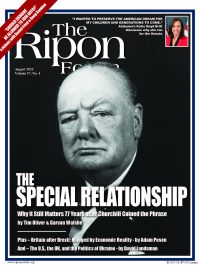
The issue of Ukraine’s security and its NATO membership that dominated the July 11-12 Vilnius Summit is a part of a larger strategic question — are the countries east of Germany that freed themselves from Moscow’s domination starting in 1989 part of an undivided Europe? Or do all or some of them belong to a Kremlin sphere of domination and thus are excluded from the European and transatlantic family?
With the partial exception of President Trump, U.S. presidents from the early-1990s concluded that the avowed U.S. goal of a Europe whole and free was serious. All Europe’s nations are — if they make the grade in terms of democracy, free markets, and the rule of law — eligible to join the European Union and NATO. The question at Vilnius was whether that policy extended to Ukraine.
President Clinton led the way in opening NATO’s door for Poland, Czechia, and Hungary. President George W. Bush led NATO to invite nine more countries, including Estonia, Latvia, and Lithuania. EU membership generally followed. At his last NATO Summit, in Bucharest in 2008, President Bush pushed hard to put Ukraine and Georgia on the road to NATO membership by giving them a NATO “Membership Action Plan” (or MAP). NATO split on that question — no MAP, but agreement in principle that NATO membership was the agreed objective for both countries. But over the next 15 years, neither Ukraine nor Georgia advanced toward NATO membership. In the meantime, Russia attacked both countries — Georgia in 2008 in a brief war and Ukraine in 2014 when it seized Crimea and parts of Luhansk and Donetsk Provinces; and again in 2022, when Russia launched a full-fledged war of conquest.
Ukraine’s argument is essentially that because Russia has never attacked a NATO country, peace for Europe requires Ukraine’s NATO accession. It’s a strong argument.
Ukraine — fighting for its life and holding off Russia’s army with courage, skill, and weapons from the United States and Europe — has been pushing hard for NATO membership, arguing that joining the alliance is the best and perhaps only way to end the Kremlin’s ambitions to destroy the Ukrainian nation. Ukraine’s argument is essentially that because Russia has never attacked a NATO country, peace for Europe requires Ukraine’s NATO accession. It’s a strong argument. Putting Ukraine in a sort of “gray zone” of ambiguity means insecurity, essentially a green light for Russian President Vladimir Putin to keep trying to conquer his neighbor.
This was NATO’s challenge for its Vilnius Summit — advance Ukraine’s NATO membership while that country is at war and risk igniting a NATO-Russia conflict? Or keep Ukraine out and signal that, in the end, Ukraine is part of the Russian Empire that Putin is desperate to rebuild?
NATO did pretty well on that key question, announcing that: “Ukraine’s future is in NATO…We will be in a position to extend an invitation to Ukraine to join the Alliance when Allies agree and conditions are met.” That means basically that Ukraine won’t be invited to NATO at this stage of the war but that membership is coming. Critics point out that the language is non-binding and includes no timetable. This is true, and the language isn’t self-executing, which means Ukraine and its friends will have to push. But NATO has crossed a line — Ukraine’s NATO membership seemed off the table just months ago, and now the issue is how and when Ukraine can join. The G7 supplemented NATO’s decision the following day by issuing a statement offering to negotiate detailed military and other forms of support. That’s no security commitment on the order of NATO’s Article 5. But it could be a sort of scaffolding to help Ukraine get from where it is now to where it wants to be.
What is the U.S. interest in all this? It is the same as our interest in World War II and the Cold War — we didn’t want aggressive dictators rampaging around Europe or occupying half of it. We don’t want Putin to rebuild the Russian Empire through wars of conquest now.
Ukrainian President Volodymyr Zelensky pushed for more right up to the summit. Wisely, he chose to take what Ukraine was offered, say thank you, and prepare to push again. Fair enough. The Vilnius Summit could have gone farther. But what it achieved can be built on, frustrating Putin’s aggressive designs and advancing the growth of what we used to call the Free World.
What is the U.S. interest in all this? It is the same as our interest in World War II and the Cold War — we didn’t want aggressive dictators rampaging around Europe or occupying half of it. We don’t want Putin to rebuild the Russian Empire through wars of conquest now. We want to see a united and secure Europe, an indispensable partner and ally for the United States in a tough world. Ukraine is fighting, as the saying goes, for its freedom and ours.
Ambassador Daniel Fried is an American diplomat, who served as assistant secretary of state for European and Eurasian affairs from 2005 to 2009 and United States ambassador to Poland from 1997 to 2000. Ambassador Fried is currently a Weiser Family Distinguished Fellow at the Atlantic Council. He is also on the Board of Directors of the National Endowment for Democracy and a Visiting Professor at Warsaw University.




